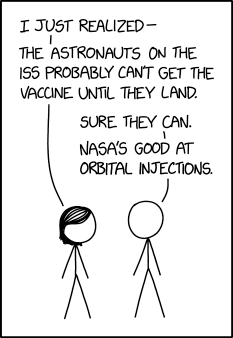2449: ISS Vaccine
| ISS Vaccine |
 Title text: Because they orbit the Earth every 90 minutes, some astronauts should try to argue that, due to CDC regulations and time zone technicalities, they should be able to get their second dose just 30 or 40 hours after their first. |
Explanation[edit]
This comic is another in a series of comics related to the COVID-19 pandemic, specifically regarding the COVID-19 vaccine.
Megan has just realized that the astronauts on the ISS (the International Space Station) probably can't get a vaccine against COVID-19 before they land. That is, it will not get shipped up to them.
This can be a concern because their immune system is impacted by extended stays in space. So when they come down again they may need to stay in quarantine longer, as the vaccine is not fully effective the first few weeks after administration. There could of course also be concern about getting COVID-19 while in space, but this is very unlikely due to the quarantine measures and other security measures taken by NASA and their Russian counterpart, Roscosmos. See this article with more details on these facts: What NASA is doing to keep COVID-19 off the space station.
Cueball's reply, "NASA's good at orbital injections", is a pun on "orbital injection", also called orbital insertion, which is the adjustment of a spacecraft’s momentum that puts it into a stable orbit around a planet, moon, or other celestial body. Space agencies like NASA do this routinely on spaceflight missions. Getting an injection of a COVID-19 vaccine while in orbit aboard the ISS could also be called orbital injection, hence the pun.
The title text refers to the fact that, because the ISS orbits the Earth every 90 minutes, the people aboard it experience a day in that time, seeing a sunrise and sunset and crossing the International Date Line on the ground. One interpretation of this might be that 90 minutes on the ISS are equivalent to a day on the ground, making the people on board due for the second dose of the Pfizer vaccine (normally 21 days) or the Moderna vaccine (normally 28 days) after 31.5 or 42 hours, respectively, which Randall rounds to 30 or 40 hours. In reality, rather than tracking the local time of the territories it passes above, the ISS follows Coordinated Universal Time.
Transcript[edit]
- [Megan and Cueball are standing talking to each other.]
- Megan: I just realized—
- Megan: The astronauts on the ISS probably can't get the vaccine until they land.
- Cueball: Sure they can.
- Cueball: NASA's good at orbital injections.
Discussion
https://en.wikipedia.org/wiki/Orbital_maneuver#Transfer_orbits (it'd be an amazing pun if COVID vaccinations were administered into your eyeballs! because the eyeholes in the skull are called orbits)172.70.35.17 23:03, 12 April 2021 (UTC)
- If an astronaut gets a severe case of conjunctivitis, maybe they'd get an orbital injection. Barmar (talk) 23:59, 12 April 2021 (UTC)
- Would NASA have to supply suppositories, instead of injections, for any such medical missions to the seventh planet? 141.101.99.207 01:07, 13 April 2021 (UTC)
- Thanks for the puns y'all! Cracked me up xD 172.70.45.206 14:33, 13 April 2021 (UTC)
What about the part of the comic that side-steps the low likelihood of COVID-19 impacting the ISS in the first place? Brilliantnut (talk) 01:17, 13 April 2021 (UTC)
- Good link containing a lot of material that could be added to the explanation. Space sickness resembles covid-19 already. Does not address when, how, and whether the astronauts are innoculated, but it sounds like the ones in the air are ripe for infection, and they receive the vaccine after return. 162.158.63.20 17:33, 13 April 2021 (UTC)
Randall, come here. Yes, right here. Stand still. THWACK! THWACK! THWACK THWACK THWACK THWACK THWACK! That is all, you may go now.108.162.219.92 05:42, 13 April 2021 (UTC)
- What is this about exactly? I looked at your thwacks and they do not appear to spell s-o-s in morse code, but I suppose they do in body language. I'm guessing Steve Bannon sent you? 162.158.63.20 17:33, 13 April 2021 (UTC)
- Puns get thwacked. That is all. (For the uninitiated, "thwacking" involves pretending to hit someone while making hitting noises.)108.162.219.68 19:42, 16 April 2021 (UTC)
- I think astronauts do get injections in space but i'm not sure. I am sure they draw blood for science. --172.68.57.43 14:41, 14 April 2021 (UTC)
An interesting property of synthetic vaccines such as the current mRNA ones, is that (given that you have the proper equipment and consumables) you can straight away start producing it without ever having seen the actual virus. In the future, a colony on a different planet that has an appropriately equipped bio lab (DNA synthesis, plasmid bacteria transformation and/or RNA polymerase, mixing fats into bubble ("nano particles") and the microfluidics to load one into another), could start producing the vaccine locally after merely receiving a FASTA file describing the Spike's sequence. (Exactly the same way as Pfizer/Biontec and Moderna could start filing application for their vaccine as soon as NC_045512.2 got uploaded on NCBI, before even getting a specimen from China). DrYak (talk) 15:41, 14 April 2021 (UTC)
Early astronauts were quarantined after landing to protect Earth from spaceborne viruses. Now astronauts need to be quarantined after landing to protect them from earthborn viruses. These Are Not The Comments You Are Looking For (talk) 20:53, 17 April 2021 (UTC)